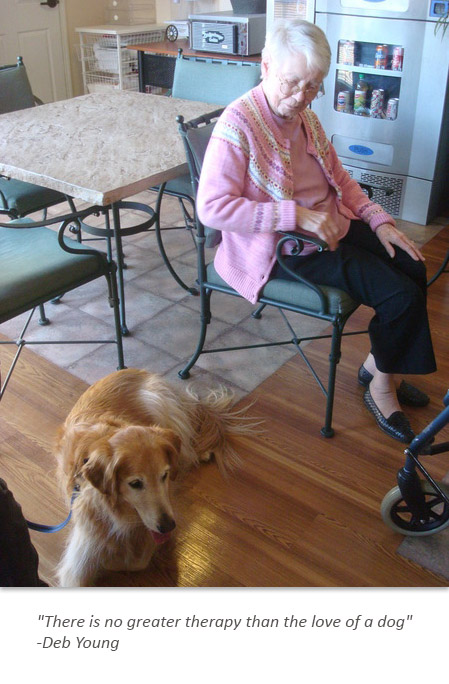Bringing Joy to Elders via The Use of Therapy Dogs
By Dr. De Leon
“There is no greater therapy than the love of a dog“-Deb Young
In millions of homes, hospitals, and nursing homes this extraordinary bond between a pet, in this case a dog, and a human is being forged around the world every day. After many years of working in the medical field I have witnessed the power of a trained animal such as a dog lift even the most recalcitrant of spirits. It is hard to stay sad or mad when confronted with a docile gentle creature who asks for nothing in return of its unconditional love other than a few strokes. It is no wonder this therapeutic modality is fast becoming one of the preferred methods of helping people in assisted living facilities and nursing homes.
Even myself who has severe allergies to these wonderful creatures can’t help but want to interact with them, petting them ever so gently as an infant while they make their rounds visiting the hospital ward, hospice, or nursing homes. A brief interaction with these well -tempered animals can leave a powerful and lasting impression for those who come in contact with them.
Therapy dogs are trained and selected like service dogs. They come in all breeds and sizes selected for their friendly, and gentle disposition. They are required to handle all types of stressful situations in order to provide a soothing effect for those they come in contact with. However, because these animals may have some minor medical issues themselves or get easily distracted in crowds, they do not qualify as service dogs.
3 types of service dogs:
- Therapeutic Visitation dogs
- Facility therapy dogs
- Animal Assisted therapy dogs
“Therapeutic visitation dogs” are the most common type. These are household pets whose owners take time to visit facilities with people in need such as hospitals and assisted living facilities. The other types of “Therapy dogs” are often paired with social workers, psychologists, and other ancillary services to provide healing and treatment for those in need such as those who are secluded, bed bound, or those suffering chronic illnesses. Therefore, sometimes a dog needs to be lifted into someone’s bed or lap to allow the infirm to stroke or hug them. Other times these therapy animals perform tricks and games for their audience.
Benefits of having these furry animals come visit your facility are as follow:
- Give residents something to look forward and something to talk about increasing their socialization and removing their focus away from their own illness or situation and breaking the monotony of living in a facility.
- They have a calming effect great for those who are agitated due to dementia or other illnesses.
- They also provide patients and people with the opportunity to have physical contact with another living creature -crucial since many elders lack physical stimulation and warmth in many long term facilities. Touch is a basic need that never leaves us thus these animals can fill that void without judgement or expectations of reciprocity.
- Dogs are a great antidote for depression, they stimulate positive feelings and may evoke
memories and warm thoughts of past pets. Makes people feel alive and important rather than alone and forgotten. Also helps people with pets at home to try to rehab quicker to return to their pets. - They help with mobility as well, if individuals in facilities are allowed to walk the animal.
- Helps with the grieving process for those with recent trauma or loss of a loved one as well as helping to lessen anxiety for those who are in hospice anticipating death by providing palliative care. Dogs are extremely sensitive creature who seem to respond to all of our emotions at a primitive level usually nuzzling or licking those who are crying. Thus providing wordless emotional relief or help facilitate discussion with their counselors.
- Help break down language and social barriers. Dogs love everyone!How to get started at your facility with a therapeutic dog:
Contact the national registry for participating members in the area or even get facility staff who own dogs to see if their dogs qualify to be ‘therapy dogs’ and become registered as visitation therapeutic dogs. Have these ancillary members or facility staff begin to bring their pet to work periodically giving everyone something to look forward to each day.
In deed there is no greater love than that of a DOG!
By Dr. Maria De Leon exclusively for Assisted Living Directory
Photo by Paula Attribution 2.0 Generic (CC by 2.0)
More:
http://www.therapydogs.org/documents/Therapy%20Dogs%20in%20the%20Long.pdf






Thanks for sharing! At our facility, St. Anne’s Guest Home, we have two dogs, a poodle and a yellow lab.
We actually posted an article about the benefits of pets in April on our blog: https://stannesguesthome.wordpress.com/2015/04/20/national-pet-month-the-positive-effects-of-animals-especially-dogs-with-people/
Thank you Sr. Christina! I’ll check out your post. I am certain that the doggies in your house add so much life and energy. I can’t imagine how it could ever have a negative impact other than a little mess or shedding here or there! Thanks for sharing!
David
Thank you Sr. Christina for sharing your wonderful post and thought with us. I agree that these beautiful creatures can provide a source of healing that escapes all of us involved in healthcare especially those who have suffered emotional, physical or psychological trauma or loss.
I love the use of therapy dogs in patients with epilepsy and other chronic condition including Parkinson’s.
Mental illness,unhealthy food and atmosphere causes bad effects on our health.We take medical care and get recovered. But along with all this a change is require.I have experienced that change by living at Royal Care home health care center for few days.It is really very beneficial for senior people and it is especially based on concept of elderly care.